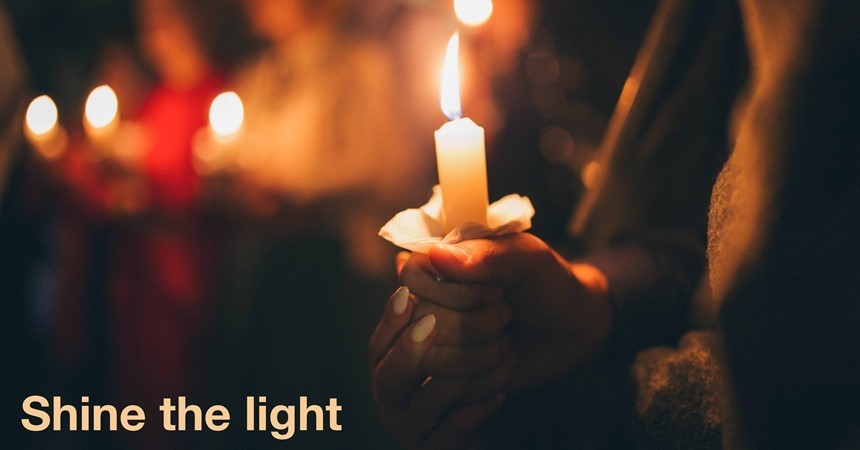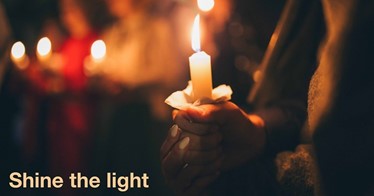The following words of explanation can be found on The Office of Safeguarding website and as part of the diocesan resources:

 In 2017 as part of Lina’s Project, Bishop Bill established September 15 as a Perpetual Day of Remembrance throughout the diocese. Such a day holds before us our history of child sexual abuse and the reality of its continual unfolding in the lives of those directly and indirectly affected. The intention is that this day be marked in a variety of ways including survivor led events which will grow and develop from year to year. It is hoped that these events provide an opportunity for all of us to stand with survivors. It is equally important that the Church mark this day with prayer, ritual and worship. As a people of faith, commissioned by Jesus to live in remembrance of him, we know the importance of remembering. Our remembering not only functions to ensure that such abuse never happens again, more than that, it is penetrated with the light of Christ’s Paschal Mystery and so becomes the source of our ongoing conversation and hope. Our Church response is shaped by our liturgical wisdom and experience and by the light of the Paschal Mystery. Hopefully it too will grow and develop from year to year.
In 2017 as part of Lina’s Project, Bishop Bill established September 15 as a Perpetual Day of Remembrance throughout the diocese. Such a day holds before us our history of child sexual abuse and the reality of its continual unfolding in the lives of those directly and indirectly affected. The intention is that this day be marked in a variety of ways including survivor led events which will grow and develop from year to year. It is hoped that these events provide an opportunity for all of us to stand with survivors. It is equally important that the Church mark this day with prayer, ritual and worship. As a people of faith, commissioned by Jesus to live in remembrance of him, we know the importance of remembering. Our remembering not only functions to ensure that such abuse never happens again, more than that, it is penetrated with the light of Christ’s Paschal Mystery and so becomes the source of our ongoing conversation and hope. Our Church response is shaped by our liturgical wisdom and experience and by the light of the Paschal Mystery. Hopefully it too will grow and develop from year to year.
During the week I had sent to me an article, Beyond Scandal and Shame? Ecclesiology and the Longing for a Transformed Church, written by Fr Richard Lennan which was published in Theological Studies, 2019, Vol. 80(3) 590-610. It took me a few days to read due to the depth of what he was writing and the impact it had on me, because of all we have endured and continue to endure, for some as individuals and for others as a community. The article engages three tasks – facing the church’s brokenness; understanding the church in terms of grace and human freedom; and facilitating the participation of all the church’s members. The focus of the article is around transformational leadership.
Richard Lennan speaks of the reality we face:
Catholics had hoped that their church would be a locus for good in the world – had hoped that its leaders would lift burdens, not victimize the vulnerable. Since the abuse scandal has depicted a very different church, Catholics of all ages and backgrounds now question whether continued participation in the church is compatible with personal integrity…
Contemporary Catholics can only envy the revival of hope and evangelical fervor that the encounter with the risen Christ produced in the once-distraught disciples (Luke 24:32-33). Members of the church can desire such a transformation, while recognising that the prospects for it seem remote in the midst of all that blights their community. (p595)
On the same page he says that;
Authentic transformation, in short, requires an appreciation that “the church” is other than an object, and particularly that it is never independent of God, history and its members.
 As I read the article I could not help but think about the Plenary Council and our own Diocesan Synod. Last week and this week some members of the diocesan Plenary Council Core Team are going out to help with the ongoing formation of animators who will assist with the Listening and Discernment process of the six themes of the Plenary Council. I am disappointed that so few people are engaging in these sessions and I wonder how many will engage once the program of Listening and Discernment is made available in parishes, schools, agencies and the community. And so as I read Richard’s article, I wonder if people have given up on the hope of which he speaks so strongly.
As I read the article I could not help but think about the Plenary Council and our own Diocesan Synod. Last week and this week some members of the diocesan Plenary Council Core Team are going out to help with the ongoing formation of animators who will assist with the Listening and Discernment process of the six themes of the Plenary Council. I am disappointed that so few people are engaging in these sessions and I wonder how many will engage once the program of Listening and Discernment is made available in parishes, schools, agencies and the community. And so as I read Richard’s article, I wonder if people have given up on the hope of which he speaks so strongly.
I am very conscious that we have been let down and people are tired, disillusioned and damaged. Trust and truth have been broken, in an institution where these elements are at its core, and he uses the following phrase, “where the Catholic “brand” has become toxic.” (p597) And yet he goes onto say on p598 “The breach in the church’s relationship with the broader society is of great moment for the church’s ongoing mission.” We have been betrayed and let down by people who were in leadership roles. He speaks of a dislocation:
The clerical sexual abuse scandal constitutes for Catholics an experience of “dislocation,” a notion that equates with homelessness and a loss of certainty. At the heart of this dislocation in anxiety that “the God who was once familiar, because God was ‘locatable’ in a religious geography and scientific cosmology is no longer easily found. (p599)
He acknowledges that faith comes from God, in the section on ‘Ecclesiology for a Graced and Human Church’:
The effort to present ecclesial faith favourably must not obscure the fact that faith in the church is distinguishable from faith in God. This distinction recognises that faith draws its sustenance not primarily through the church, but from the God of Jesus Christ mediated through the Holy Spirit. God transcends the church. Likewise, it is the constancy of God’s grace, rather than the actions of authorities in the church, or even of the Christian community as a whole, that is the substratum of the faith that the members of the church share. (p601)
This grace and the work of the Holy Spirit is incarnational and therefore takes place within a community of disciples, it is relational and not private.
Consequently, an irreducible aspect of the process by which the Holy Spirit accomplishes the mission to “guide you into all truth” (John 16:13) is the formation of a community of disciples, who are identifiable as “the body of Christ” (1 Cor 12:27), the church. (p601)
We are being called to critique the church as it is, so that it might become the church as it should be, and I believe this is the work that the Plenary Council is undertaking, a work that must be done prayerfully, with discernment and contemplation and within the community of disciples. This dialogue requires listening attentively to the voices of others so as to hear the voice of the Spirit. We are all called to take part, to have a voice and to listen.
Mutual listening in which everyone has something to learn. The faithful people, the college of bishops, the Bishop of Rome: all listening to each other, and all listening to the Holy Spirit, the ‘Spirit of truth’ (John 14:17), in order to know what [the Spirit]’says to the Churches’ (Rev 2:7). (Pope Francis 2015 speaking on synodality).
Towards the end of the article he says:
As members of the Catholic Church share the anguish over that damage, they also share the conviction that there must be change in their church. In support of the possibilities for change, ecclesiology affirms that church’s existence as a pilgrim in need of conversion, affirms the church’s God-given freedom to change, and affirms that the grace of God’s creative Spirit is at work in all of the baptised so that change can be the work of the whole people of God. (p609)
All of this reminds me of the Shadow Work writings of Richard Rohr. He writes:
Our shadow self is any part of ourselves or our institutions that we try to hide or deny because it seems socially unacceptable.
The term shadow refers to everything within us that we don’t know about ourselves. It’s often called our disowned self. Jesus called it “the log in your own eye,” which you instead notice as the “splinter in your brother’s eye” (Matthew 7:3-5). His advice is absolutely perfect: “Take the log out of your own eye, and then you will see clearly enough to take the splinter out of your brother’s eye” (7:5).
Human consciousness does not emerge at any depth except through struggling with our shadow. It is in facing our conflicts, criticisms, and contradictions that we grow. It is in the struggle with our shadow self, with failure, or with wounding that we break into higher levels of consciousness. People who learn to expose, name, and still thrive inside the contradictions are prophets. (Shadow Work Daily Mediations of the week of 7-14 September)
It seems to me that we are experiencing the shadow side of our church and we need to claim and own this shadow and to work on it so as to learn from it and to be transformed by it. We need to seek out our prophetic voices.
I finish this week’s message with part of the prayer from the resources for the Perpetual Day of Remembrance:
Create a clean heart in us O God.
Where people are disempowered
May we shine the light of your paschal wisdom.
Where there is privilege and prestige
May we shine the light of your humility.
Where there is dishonesty and denial
May we shine the light of your truth.
Where transparency doesn’t exist and agendas are hidden
May we shine the light of your integrity.
Where there is fear
May we shine the light of your peace.
Where there is judgement
May we shine the light of your compassion.
Where there is disrespect
May we shine the light of your love.
Where people feel silenced
May we shine the light of your word.
Where people feel excluded
May we shine the light of your acceptance.
Where there is sin
May we shine the light of your forgiveness.
Create a clean heart in us O God.
Please don’t give up, please stay connected so we can be transformed and renew the face of the earth.